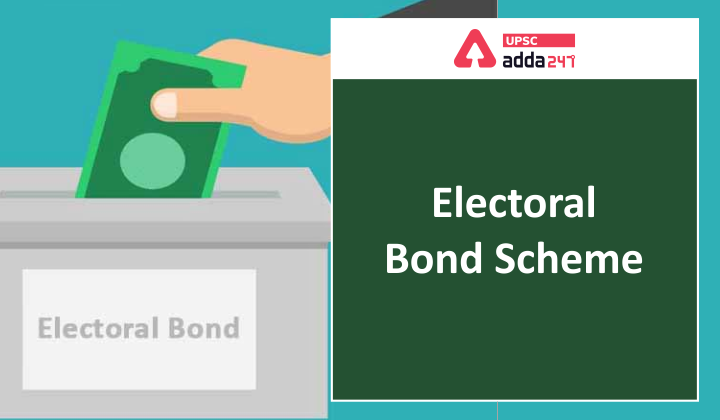Table of Contents
Relevance
- GS 2: Structure, organization and functioning of the Executive and the Judiciary—Ministries and Departments of the Government;
Context
- According to the recently released report by Association of Democratic Rights (ADR), Electoral bonds worth ₹3,429.56 crore were redeemed by parties in 2019-20, and 29% of this was received by four national parties – the BJP, Congress, TMC and the NCP.
About Electoral Bonds
- Electoral Bond is a financial instrument for making donations to political parties.
- It is an initiative of Department of Economic Affairs, Ministry of Finance.

Features of Electoral Bonds
- Electoral Bond is in the nature of a Promissory Note and an interest free banking instrument.
- A citizen of India or a body incorporated in India will be eligible to purchase the bond.
- Electoral bond would be issued/purchased for any value, in multiples of 1,000, from the specified branches of the State Bank of India (SBI).
- The bond will not carry the name of payee.
- Electoral Bonds validity is of only 15 days during which it can be used for making donation only to the political parties registered under of the Representation of the Peoples Act, 1951 and, which secured not less than one per cent of the votes polled in the last general election to the House of the People or a Legislative Assembly.
- The bonds under the scheme shall be available for purchase for a period of 10 days each in the months of January, April, July and October, as may be specified by the Central Government.
- The bond shall be encashed by an eligible political party only through a designated bank account with the authorised bank.
Election Commission of India (ECI)
Issues with the Electoral Bonds
- Anonymity: Neither the donor nor the political party is mandated to reveal the name of the doner. This secrecy might lead to entry of black money in the electoral process.
- Control Over usage: There is no mechanism to check the usage of these bonds, the court has even asked the government whether there is any control over how these donations were used by political parties.
- More bonds to ruling party: Ever since the electoral bonds came in, most of the electoral bonds went in favour of ruling party. While the reason could be just, the chances of miss-use of electoral bonds for vested interest cannot be ignored.
- Possibility of Money Laundering: The electoral bonds ended all the safeguard that were present in corporate donations to Political parties through Companies Act.
- Indian, foreign and even shell companies donate to political parties without any need to inform anyone about the contribution.
- Question on procedure followed: The scheme was brought in through amendments to finance bill as the government did not have majority in the Rajya Sabha.
- It was criticised for bypassing the parliamentary provisions.



 TSPSC Group 1 Question Paper 2024, Downl...
TSPSC Group 1 Question Paper 2024, Downl...
 TSPSC Group 1 Answer key 2024 Out, Downl...
TSPSC Group 1 Answer key 2024 Out, Downl...
 UPSC Prelims 2024 Question Paper, Downlo...
UPSC Prelims 2024 Question Paper, Downlo...
